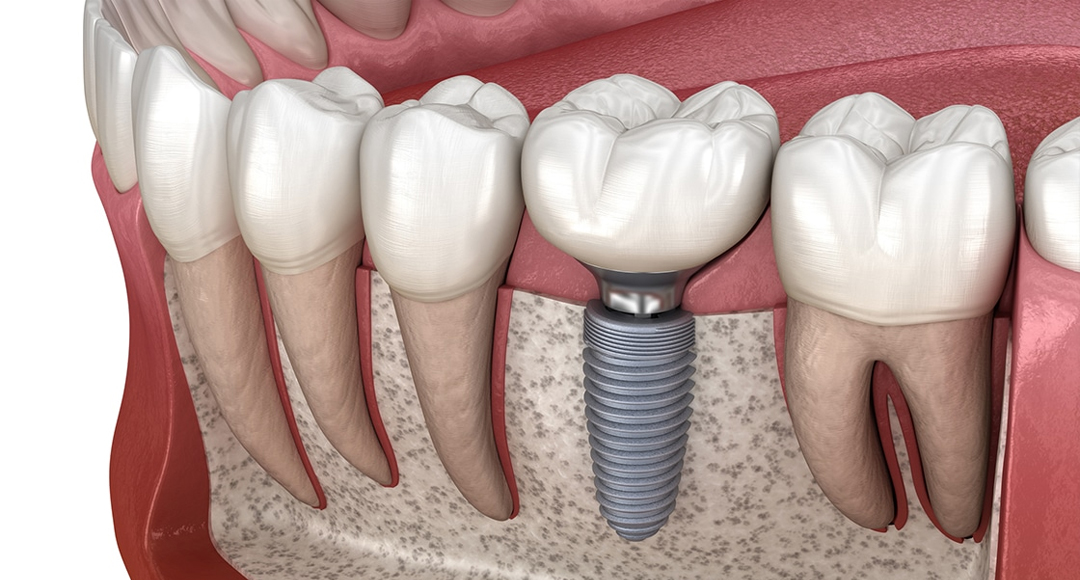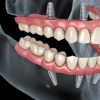Complete Guide to Dental Implants: Everything You Need to Know
Millions of people grieve over tooth loss despite the advances in dental care. The major causes are tooth decay, periodontal disease, or injury. For many years, dentures and bridges were the only options for people with missing teeth; however, with the introduction of implants in dentistry it has become rather convenient for patients to get a permanent solution.
Dental implants are metal posts (screws) surgically implanted into the jaw to restore a person’s ability to chew or their appearance. They support artificial teeth like bridges, crowns, or dentures. Now, Let’s talk about the future of Dentistry in this article!
What Exactly is a Dental Implant?
A dental implant is a surgical part that links to the jaw or skull bone to support a dental prosthesis like a bridge, crown, or denture. The material used in implants is Titanium, the only metal biocompatible with our body. The implant, once inserted, undergoes a process known as osseointegration, i.e., the implant fuses with the bone.
A variable amount of time is required for the osseointegration to heal before a dental prosthesis can be added. A standard implant is typically made up of a titanium screw (like a tooth root) with a textured or smooth surface. The vast majority of dental implants are constructed from commercially pure Titanium.
Implant dentistry involves planning and placing dental implants to address various dental issues. It focuses on the patient’s overall health, the local health of the mucous membranes and jaws, and the size, size, and position of the jaw bones, adjacent and opposing teeth. Few health issues limit implant placement, while some can raise the chance of implant failure.
The pressures that implants must support influence their long-term success in part. Because implants lack the periodontal ligament, there is no pressure sensation when biting. To compensate, implant placement must transmit forces uniformly across the prosthesis they support. Fusing implants and the bone can support physical loads for decades without failure.
When a person loses a tooth due to injury or disease, a person may experience issues such as rapid bone loss, faulty speech, or changes in chewing patterns that cause pain. Repairing a lost tooth with a dental implant can dramatically enhance the patient’s quality of life and health.
Dental implant systems are made up of a dental implant body and an abutment, as well as an abutment fixation screw. The dental implant abutment is normally screwed to the implant body and continues through the gums into the mouth to stabilise the attached artificial teeth.
Recommendations for Patients
Before deciding on dental implants, consult with your dentist about the potential benefits and hazards and whether you are a candidate for the operation. Consider the following:
- Your overall health greatly impacts whether you are a good patient for dental implants, the duration to heal, and how long the implant lasts.
- Inquire with your dentist about the brand and model of the dental implant system being utilised, and retain this information for your records.
- Smoking may interfere with healing and reduce the implant’s long-term success.
- The implant body may take several months or longer to recover, during which time you will normally have a temporary abutment in place of the tooth.
Following the dental implant procedure:
- Follow your dentist’s oral hygiene guidelines to the letter. Cleaning the implant and adjacent teeth regularly is critical for long-term success.
- Make regular appointments with your dentist.
- Inform your dentist straight away if your implant seems loose or painful.
Advantages of Dental Implants
Dental implant procedures offer numerous benefits to patients. These include:
- Restoring the ability to chew: Dental implants provide a sturdy foundation for artificial teeth, allowing individuals to regain their ability to chew and enjoy a variety of foods.
- Restoring cosmetic appearance: Implant Dentistry functions like natural teeth and contributes to a pleasing aesthetic appearance. They seamlessly blend with the surrounding teeth, enhancing the overall smile.
- Keeping the jawbone from losing shape due to bone loss: Dental implants simulate the presence of natural tooth roots, stimulating the jawbone and preventing its deterioration. This helps preserve the bone structure and to avoid shrinkage.
- Preserving the bone and gums: By replacing missing teeth with dental implants, the health of the neighbouring bone and gums is maintained. The implants integrate with the jawbone, providing stability and preventing the progression of oral health issues.
- Helping keep adjacent (nearby) teeth stable: Dental implants fill the gaps left by missing teeth, preventing adjacent teeth from shifting or becoming unstable. They provide support and avoid detrimental changes in tooth alignment.
- Improving the quality of life: Dental implants significantly improve one’s quality of life. They restore oral functionality, confidence in appearance, and the ability to enjoy various foods. This leads to increased comfort, self-esteem, and overall well-being.
During the implant surgery, an artificial tooth is securely placed into the jawbone, providing a stable and long-lasting solution for tooth replacement. This implant tooth procedure allows individuals to regain the benefits of natural teeth and enjoy improved oral health.
Risks of Dental Implants
During the process of dental implant placement, there can be potential risks and complications that may include:
- Damage to natural teeth during implant placement: Although rare, there is a possibility of unintentional damage to nearby natural teeth during the placement of dental implants.
- Injury to the tissues during surgery, such as sinus perforation: In some cases, the sinus cavity above the upper jawbone may be inadvertently perforated during implant surgery, leading to potential complications.
- Injury during surgery, such as fracture of the surrounding jawbone: While uncommon, there is a slight risk of jawbone fracture during the surgical procedure for dental implants.
- Inadequate function, such as the sensation that the teeth do not ordinarily bite together: Occasionally, patients may experience issues with the alignment or bite function of their implant-supported teeth, resulting in a feeling of abnormal bite alignment.
- The sensation of tooth looseness or twisting due to abutment screw loosening: In rare instances, the screw connecting the implant abutment and artificial tooth may loosen, causing tooth instability or twisting.
- Implant failure (looseness of the implant body): Although uncommon, implant body loosening or loss is risky. This may occur due to systemic infections, local infections in the bone and gums surrounding the implant, or delayed healing, which is more likely in smoking patients.
- Cleaning the gums around the implant is difficult, resulting in poor dental hygiene: Maintaining proper oral hygiene around dental implants is crucial. Inadequate cleaning of the gums surrounding the implant may lead to inflammation, infection, and compromised oral health.
- Untreated periodontal disease: Untreated periodontal (gum) disease can jeopardise the success of dental implants. Treating periodontal disease before undergoing implant placement is important for long-term success.
- Numbness after surgery caused by nerve impingement or damage: In rare cases, there may be temporary or permanent numbness or altered sensation in the surrounding tissues due to nerve impingement or damage during the implant procedure.
It is important to inform healthcare providers and imaging technicians about dental implants’ presence before any magnetic resonance imaging (MRI) or x-ray procedures. Dental implants can potentially cause distortion or interference in these imaging techniques.
Take Away
In conclusion, dental implants offer a remarkable solution for tooth loss, providing numerous benefits and improving oral health. If you’re considering getting dental implants, contact a knowledgeable dentist who can walk you through the process and assure the best possible outcome. Remember that excellent oral hygiene is essential for your dental implants’ long-term durability and success.
Make sure to follow your dentist’s recommendations for oral hygiene, attend regular check-ups, and promptly address any concerns. For ideal dental care and to explore the possibility of dental implants, schedule an appointment with a reputable dentist today. Start moving in the direction of a happy smile and better health.




